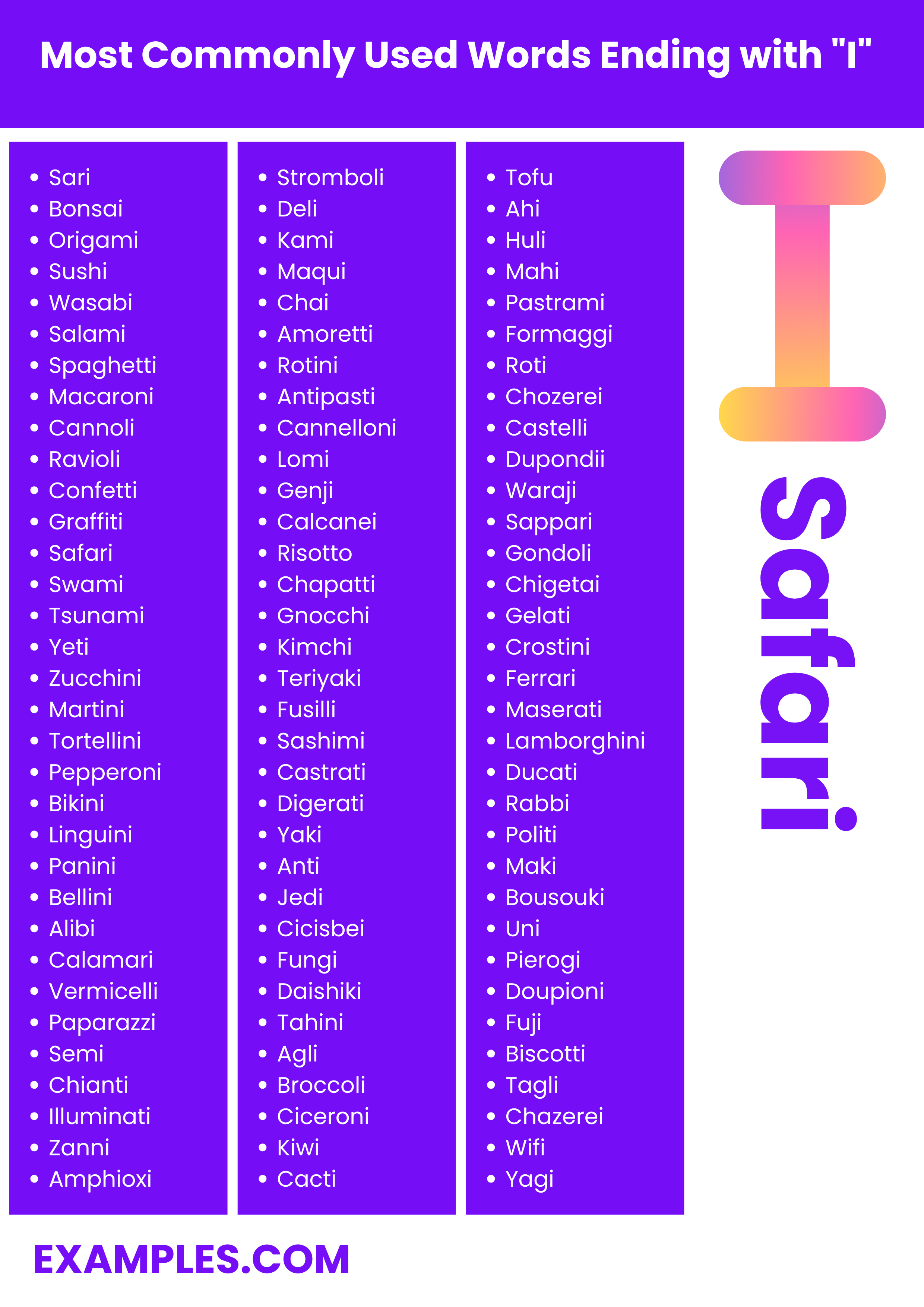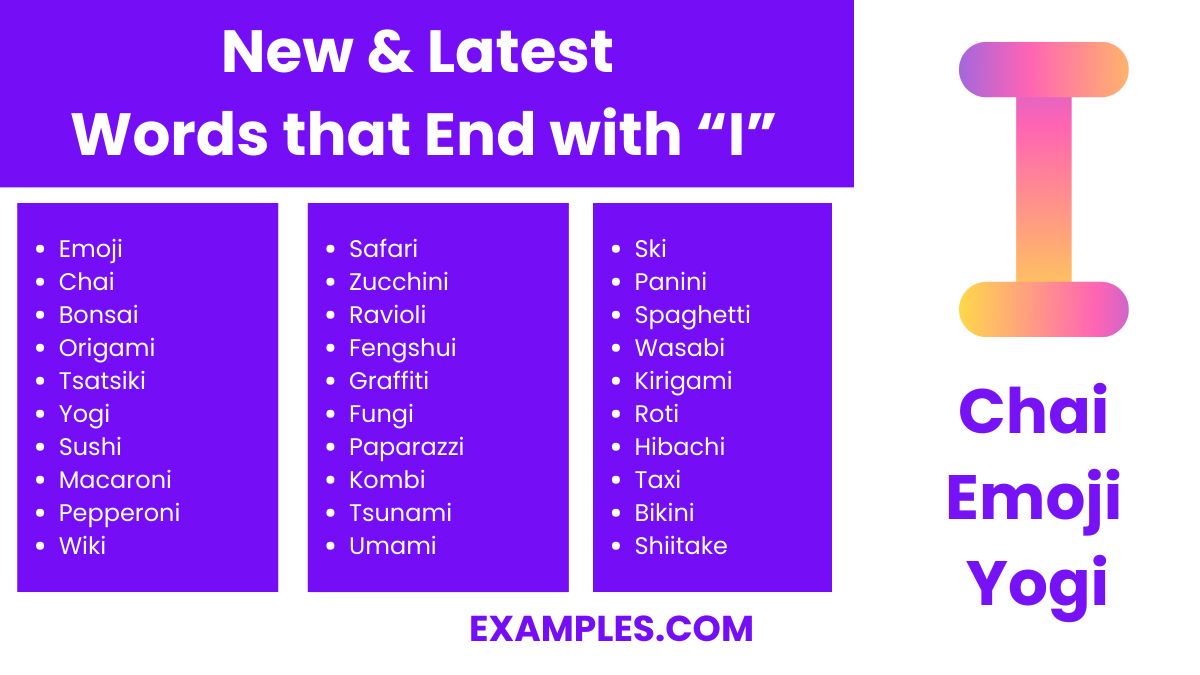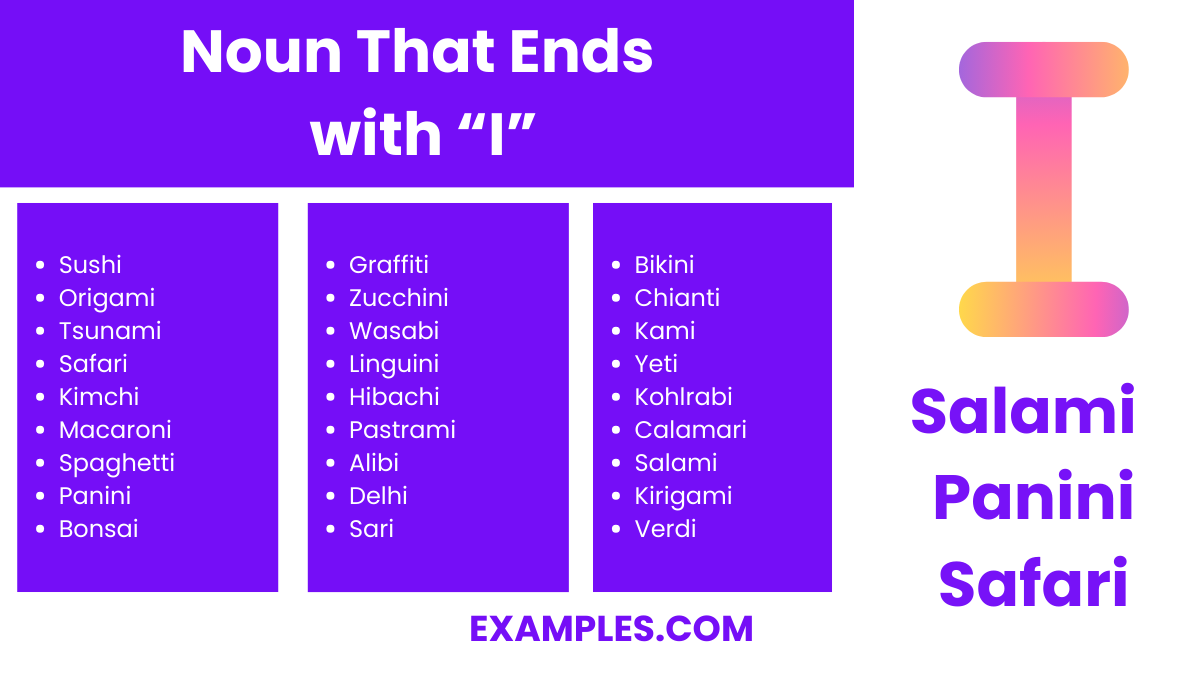150+ Words Ending With I List, Meaning, PDF
The realm of words ending with the letter ‘I’ unveils a linguistic landscape rich in cultural and historical layers, indicative of the English language’s diverse heritage. These words, often borrowed from various languages, add a unique flavor and depth to English, enhancing its expressive capabilities. From the biological ‘fungi’ to the geographical ‘Sahari’, each ‘I’ word ending carries with it a story, connecting users to different realms of knowledge and understanding. For language enthusiasts and educators, this exploration offers a gateway to broadening vocabularies and enriching conversations, encouraging a deeper appreciation for the intricate mosaic that is English. Engaging with these words fosters linguistic curiosity and cultural awareness, enriching the tapestry of communication.
Download Most Commonly Used Words Ending with I -PDF
150 Most Commonly Used Words Ending with “I”
Focusing on words ending with ‘I’ unveils a captivating dimension of English vocabulary, offering immense value to both educators and learners. These words, often imbued with roots from a multitude of languages and cultures, inject a distinctive essence into the English linguistic tapestry. Engaging with ‘I’-ending words broadens students’ verbal toolkit, enhancing their proficiency in pronunciation, spelling, and global cultural literacy. For teachers, this collection serves as a robust tool for crafting dynamic and inclusive lesson plans, fostering an environment where students are encouraged to traverse beyond traditional vocabulary boundaries. By weaving these words into various pedagogical activities, such as Rhyming Words exercises, Daily Use English Words discussions, and interactive games, educators can facilitate a learning experience that is not only efficacious but also immensely enjoyable, nurturing a profound appreciation for the expansive and multicultural nature of English.
| Sari | Bonsai | Origami | Sushi | Wasabi | Salami |
| Spaghetti | Macaroni | Cannoli | Ravioli | Confetti | Graffiti |
| Safari | Swami | Tsunami | Yeti | Zucchini | Martini |
| Tortellini | Pepperoni | Bikini | Linguini | Panini | Bellini |
| Alibi | Calamari | Vermicelli | Paparazzi | Semi | Chianti |
| Illuminati | Zanni | Amphioxi | Stromboli | Deli | Kami |
| Maqui | Chai | Amoretti | Rotini | Antipasti | Cannelloni |
| Lomi | Genji | Calcanei | Risotto | Chapatti | Gnocchi |
| Kimchi | Teriyaki | Calamari | Sashimi | Castrati | Digerati |
| Yaki | Anti | Jedi | Cicisbei | Fungi | Daishiki |
| Tahini | Agli | Broccoli | Ciceroni | Kiwi | Cacti |
| Ravioli | Tofu | Ahi | Huli | Mahi | Pastrami |
| Formaggi | Roti | Broccoli | Chozerei | Castelli | Dupondii |
| Waraji | Sappari | Gondoli | Chigetai | Tortellini | Gelati |
| Crostini | Ferrari | Maserati | Lamborghini | Ducati | Rabbi |
| Politi | Maki | Bousouki | Uni | Pierogi | Doupioni |
| Fuji | Gnocchi | Biscotti | Vermicelli | Rigatoni | Amati |
| Baluchi | Bonaci | Carpi | Daimyo | Elhi | Fungi |
| Galabi | Haori | Clafouti | Jaci | Khaki | Lassi |
| Nauplii | Paithani | Quagmiri | Rabbini | Saki | Taari |
| Umi | Virelai | Welfari | Xoai | Yakitori | Zori |
| Abaci | Aryballi | Dashi | Eremuri | Frittati | Hoagi |
| Intagli | Jalebi | Kukri | Lari | Magi | Nairobi |
| Quassi | Sushi | Tagli | Chazerei | Wifi | Yagi |
| Ziti | Affogati | Biscotti | Cannoli | Fusilli | Macaroni |
Most Trending Words that End with “I”
In today’s ever-evolving linguistic landscape, certain ‘I’-ending words rise to prominence, reflecting shifts in culture, tech, and social paradigms. For educators aiming to resonate with students, weaving these trending terms into English lessons can be transformative. This concise list of 35 ‘I’-ending words taps into a spectrum of contemporary themes, from digital lingo to revived classics, enriching students’ conversational arsenal. Encouraging engagement with these terms, from festive Christmas Words to innovative Compound Words, not only updates students’ vocabularies but also deepens their connection with modern discourse, making English learning more dynamic and aligned with today’s linguistic trends.
- Sushi – a Japanese dish of prepared vinegared rice, usually with seafood.
- Origami – the Japanese art of folding paper into decorative shapes and figures.
- Safari – an expedition to observe animals in their natural habitat, especially in East Africa.
- Wasabi – a Japanese plant with a strong green root used as a condiment.
- Chai – a type of Indian tea, made especially with spices and milk.
- Tsunami – a long, high sea wave caused by an earthquake or other disturbance.
- Bonsai – a Japanese art form using miniature trees grown in containers.
- Kimchi – a Korean dish of fermented vegetables, typically cabbage and radishes.
- Emoji – a small digital image or icon used to express an idea or emotion.
- Wiki – a website that allows collaborative editing of its content and structure by its users.
- Yogi – a person proficient in yoga.
- Bikini – a two-piece swimsuit for women.
- Panini – a sandwich made with Italian bread, usually toasted.
- Zucchini – a variety of small summer squash.
- Ravioli – small pasta envelopes containing a filling.
- Macaroni – a variety of pasta formed in narrow tubes.
- Feng Shui – a Chinese philosophical system of harmonizing with the surrounding environment.
- Maqui – a deep-purple berry native to South America.
- Hibachi – a small Japanese-style charcoal grill.
- Kabuki – a form of traditional Japanese drama with highly stylized song, mime, and dance.
- Confetti – small pieces of colored paper traditionally thrown during celebrations.
- Spaghetti – a type of pasta made in long, slender threads.
- Graffiti – writing or drawings scribbled, scratched, or sprayed illicitly on a wall or other surface in a public place.
- Fungi – A Fungal disease
- Illuminati – a name given to various secret societies and alleged conspiratorial organizations.
- Alfalfi – a variant of ‘alfalfa,’ a plant widely grown as forage.
- Tsukiji – referring to a famous fish market in Tokyo, Japan.
- Kawaii – the quality of being cute, or items that are cute, in Japanese culture.
- Roti – an Indian flatbread.
- Antipasti – traditional Italian appetizers or starters.
New & Latest Words that End with “I”
The English lexicon is ever-evolving, presenting an exhilarating challenge for educators to stay abreast of the latest linguistic developments. To support this continuous learning journey, here’s a curated list of 35 newly minted words ending in ‘i’, mirroring the pulse of current societal, technological, and cultural shifts. These contemporary terms can substantially broaden a student’s lexical scope. Weaving these words into educational content not only rejuvenates the syllabus but also captivates students by linking their studies to the evolving world. Mastery of these Difficult Words deepens linguistic prowess, while Encouraging Words boost communicative confidence, equipping students for effective global interaction. Delve into this collection to infuse your English instruction with a fresh, modern vibe!
- Emoji – a digital icon used to express an idea or emotion.
- Chai – a type of tea made with spices and milk.
- Bonsai – the art of growing ornamental, artificially dwarfed trees or shrubs.
- Origami – the Japanese art of folding paper into decorative shapes and figures.
- Tsatsiki – a Greek yogurt-based dip with cucumber and garlic.
- Yogi – a person who practices yoga.
- Sushi – a Japanese dish of prepared vinegared rice, usually with some sugar and salt, accompanying a variety of ingredients.
- Macaroni – pasta in the form of narrow tubes.
- Pepperoni – a variety of salami, made from cured pork and beef mixed together.
- Wiki – a website that allows collaborative editing of its content and structure by its users.
- Safari – an expedition to observe or hunt animals in their natural habitat.
- Zucchini – a variety of small, elongated squash.
- Ravioli – small pasta envelopes containing a filling.
- Fengshui – a Chinese philosophical system of harmonizing with the surrounding environment.
- Graffiti – writing or drawings scribbled, scratched, or sprayed illicitly on a wall or other surface in a public place.
- Fungi – A Fungal disease
- Paparazzi – photographers who take candid photographs of celebrities.
- Kombi – a type of van, typically used for transporting goods or people.
- Tsunami – a long high sea wave caused by an earthquake or other disturbance.
- Umami – a category of taste in food, corresponding to the flavor of glutamates.
- Ski – to move over snow on skis.
- Panini – a sandwich made with Italian bread, grilled to a crispy texture.
- Spaghetti – pasta made in long, slender, solid strings.
- Wasabi – a Japanese plant with a thick green root that tastes like strong horseradish.
- Kirigami – a variation of origami that includes cutting of the paper.
- Roti – an Indian flatbread.
- Hibachi – a small Japanese-style charcoal brazier covered with a grill, used for outdoor cooking.
- Taxi – a car licensed to transport passengers in return for payment of a fare.
- Bikini – a very brief two-piece swimsuit for women.
- Shiitake – an edible mushroom native to East Asia.
Noun That End with “I”
In the realm of English language education, vocabulary expansion is key to honing communication abilities. A particularly enriching avenue for lexical growth involves exploring nouns ending with ‘i’. These nouns, which span the realms of geography, culture, and biology, offer a wealth of knowledge and intrigue. For educators dedicated to delivering well-rounded language instruction, introducing students to this diverse set of nouns can significantly widen their linguistic scope. Such words not only enhance vocabulary but also illuminate the English language’s versatility and inclusivity. This compilation includes 35 nouns ending in ‘i’, each highlighted for clarity. By weaving these Ness Words and Pictionary Words into educational content, teachers can render their lessons more captivating and educational, thereby facilitating students in cultivating a more comprehensive and varied vocabulary.
- Origami – the Japanese art of folding paper into decorative shapes and figures.
- Sushi – a Japanese dish consisting of small balls or rolls of vinegar-flavored cold rice served with a garnish of raw fish, vegetables, or egg.
- Tsunami – a long high sea wave caused by an earthquake, submarine landslide, or other disturbance.
- Safari – an expedition to observe or hunt animals in their natural habitat.
- Kimchi – a Korean dish of fermented vegetables, usually cabbage or radishes, seasoned with chili powder and salt.
- Macaroni – pasta in the form of narrow tubes.
- Spaghetti – pasta made in long, slender, solid strings.
- Panini – a sandwich made with Italian bread, usually toasted.
- Bonsai – the Japanese art of growing small, sculptured trees.
- Graffiti – writing or drawings scribbled, scratched, or sprayed illicitly on a wall or other surface in a public place.
- Zucchini – a variety of courgette.
- Wasabi – a Japanese plant of the mustard family, the root of which is used as a pungent condiment for sushi.
- Linguini – a type of pasta similar to fettuccine but narrower in width.
- Hibachi – a small Japanese-style charcoal brazier covered with a grill, used for outdoor cooking.
- Pastrami – highly seasoned smoked beef, typically served in thin slices.
- Alibi – a claim or piece of evidence that one was elsewhere when an act, typically a criminal one, is alleged to have taken place.
- Delhi – the capital territory of India.
- Ikebani – the Japanese art of flower arrangement, also known as kado.
- Sari – a garment worn by Hindu women, consisting of a long piece of cotton or silk wrapped around the body, with one end draped over the shoulder.
- Bikini – a very brief two-piece swimsuit for women.
- Chianti – a red Italian wine.
- Kami – a divine being in the Shinto religion.
- Yeti – a large hairy creature resembling a human or bear, said to live in the highest part of the Himalayas.
- Kohlrabi – a cultivated plant of the cabbage family, with an edible bulbous stem.
- Calamari – squid prepared as food.
- Salami – a type of highly seasoned sausage, originally from Italy.
- Kirigami – a variation of origami that includes cutting of the paper.
- Verdi – a type of green Italian wine.
Short Words Ending with “I”
short words ending with ‘i’ can significantly enrich students’ vocabulary. These compact yet meaningful words enhance communication, offering diverse pronunciation and spelling insights. Ideal for comprehensive language lessons, these Vowel Words and Sight Words deepen linguistic understanding. Engaging with this list of succinct ‘i’-ending words, complete with definitions, bolsters vocabulary, spelling, and creative expression. Encouraging their use in sentences and text recognition boosts English proficiency, making learning both effective and enjoyable.
- Bikini – a two-piece swimsuit for women.
- Chai – a type of Indian tea, made especially with spices and milk.
- Fungi – plural of fungus, a group of spore-producing organisms feeding on organic matter.
- Origami – the Japanese art of folding paper into decorative shapes and figures.
- Sari – a garment worn by Hindu women, consisting of a long piece of cotton or silk.
- Umami – a category of taste in food, corresponding to the flavor of glutamates.
- Bonsai – the art of growing ornamental, artificially dwarfed trees or shrubs.
- Confetti – small pieces of colored paper thrown during a celebration.
- Delhi – the capital territory of India.
- Gandhi – a surname referring to Mahatma Gandhi, a leader in the Indian independence movement.
- Hibachi – a portable Japanese charcoal brazier.
- Kamikaze – relating to a World War II Japanese aircraft loaded with explosives.
- Lassi – a traditional Indian drink made from blended yogurt, water, spices, and sometimes fruit.
- Macaroni – pasta in the form of narrow tubes.
- Paparazzi – freelance photographers who pursue celebrities to get photographs of them.
- Ravioli – a type of pasta in the form of small cases of dough containing a savory filling.
- Ski – each of a pair of long, narrow pieces of wood or plastic attached to boots for gliding over snow.
- Tsatziki – a Greek sauce made from yogurt and cucumber.
- Zucchini – a variety of small summer squash.
- Kimchi – a Korean dish made from pickled vegetables, typically cabbage and radishes.
- Martini – a cocktail made with gin and vermouth, often garnished with an olive.
- Sashimi – a Japanese dish of bite-sized pieces of raw fish.
- Teriyaki – a Japanese dish consisting of fish or meat marinated in soy sauce and grilled.
- Wasabi – a Japanese plant with a thick green root that tastes like strong horseradish, used in cooking.
- Safari – an expedition to observe animals in their natural habitat.
- Taxi – a car licensed to transport passengers in return for payment of a fare.
- Yogi – a person who is proficient in yoga.
- Yeti – an Abominable Snowman.
In conclusion, teaching words ending with ‘I’ is vital for enhancing students’ linguistic skills. These words, often unique and illustrative, enrich vocabulary and understanding. Encourage students to practice through reading and writing exercises, emphasizing pronunciation and usage in different contexts. This approach not only broadens their English proficiency but also boosts their confidence in communication. As educators, integrating these words into your lessons can significantly benefit students’ language development.







